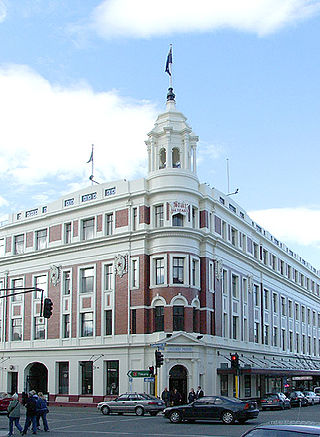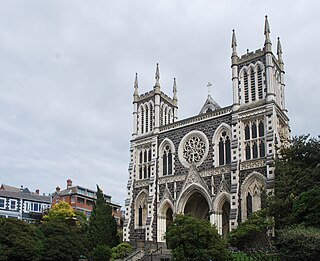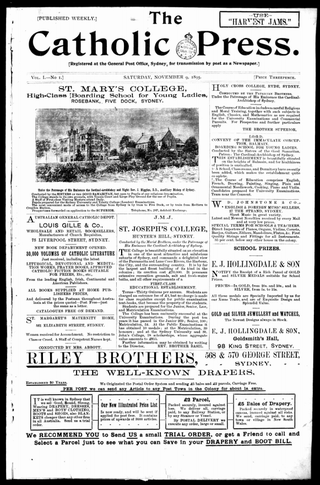Related Research Articles

Sir Robert David Muldoon was a New Zealand conservative politician who served as the 31st prime minister of New Zealand, from 1975 to 1984, while leader of the National Party. Departing from National Party convention, Muldoon was a right-wing populist and economic nationalist, with a distinctive public persona described as reactionary, aggressive, and abrasive.

The 1984 New Zealand general election was a nationwide vote to determine the composition of the 41st New Zealand Parliament. It marked the beginning of the Fourth Labour Government, with David Lange's Labour Party defeating the long-serving Prime Minister, Robert Muldoon, of the National Party. It was also the last election in which the Social Credit Party won seats as an independent entity. The election was also the only one in which the New Zealand Party, a protest party, played any substantial role.
The Tablet is a Catholic international weekly review published in London. Brendan Walsh, previously literary editor and then acting editor, was appointed editor in July 2017.

The Otago Daily Times (ODT) is a newspaper published by Allied Press Ltd in Dunedin, New Zealand. The ODT is one of the country's four main daily newspapers, serving the southern South Island with a circulation of around 26,000 and a combined print and digital annual audience of 304,000. Founded in 1861 it is New Zealand's oldest surviving daily newspaper – Christchurch's The Press, six months older, was a weekly paper until March 1863.
Trinity Catholic College is a Catholic, state-integrated, co-educational, secondary school located in central Dunedin, New Zealand. The school was founded in 1989 as the successor of several other secondary schools the oldest of which was founded in 1871. Trinity is the only Catholic secondary school in Dunedin and is open to enrolments from throughout the entire city. The school's proprietor is the Catholic Bishop of Dunedin.

The Catholic Herald is a London-based Roman Catholic monthly magazine, founded in 1888 and a sister organisation to the non-profit Catholic Herald Institute, based in New York. After 126 years as a weekly newspaper, it became a magazine in 2014. In early 2023, a 50.1% controlling stake was purchased by New York based alternative asset firm GEM Global Yield LLC SCS (Luxembourg). It reports 565,000 online readers a month, along with 30,100 weekly registered newsletter subscribers and a print readership distributed in the US and UK, Roman Catholic parishes, wholesale outlets, the Vatican, Cardinals, Catholic influencers, and postal/digital subscribers.

St Joseph's Cathedral is the cathedral for the Roman Catholic Diocese of Dunedin. It is located in City Rise in the city of Dunedin, New Zealand. It serves as the seat of the bishop of the Latin Church Diocese of Dunedin, which was erected on 26 November 1869.

The Missionary Society of St. Columban, commonly known as the Columbans, is a missionary Catholic society of apostolic life of Pontifical Right founded in Ireland in 1917 and approved by the Vatican in 1918. Initially it was known as the Maynooth Mission to China. Members may be priests, seminarians or lay workers. Fr John Blowick, one of the two founders of the Society, also founded the Missionary Sisters of St. Columban to share in their work. The society is dedicated to St. Columbanus. The current international headquarters is in Hong Kong.
Peter Thomas Bertram McKeefry was the third archbishop of Wellington (1954–73) and metropolitan of New Zealand and its first cardinal.
The following lists events that happened during 1873 in New Zealand.
The 19th-century Catholic periodical literature is unique in many respects. Most of the periodical publications in mainly Catholic countries can be regarded as "Catholic" literature up to a few decades before 1800: the editorial line is implicitly Catholic in most instances.
The Star is a free newspaper published weekly in Dunedin, New Zealand by Allied Press since 1979. It is the successor to The Evening Star, which was the city's daily evening newspaper from June 1863 to 1979.

Henry William Cleary was the sixth Roman Catholic Bishop of Auckland, from 1910 to 1929.

Michael Verdon was the 2nd Catholic Bishop of Dunedin from (1896–1918).
Rory Sweetman is a professional New Zealand historian. He teaches at the University of Otago in modern Irish history and has published widely on New Zealand's ethnic and religious past.
Zealandia was a New Zealand tabloid newspaper owned, and published weekly for 55 years, by the Catholic Bishop of Auckland. Its first issue is dated 10 May 1934 and its last is dated 23 April 1989. It was founded by the seventh Catholic Bishop of Auckland, James Michael Liston and even though its focus was on Catholic religious matters, well-known New Zealand writers were published in its columns such as James K. Baxter and John Reid. Its editors included Cardinal McKeefry and Bishop Owen Snedden, the historian Father Ernest Simmonds, the later prominent traditionalist priest, Father Denzil Meuli and Pat Booth, the newspaper's first lay editor.
John Patrick Kennedy was a New Zealand Catholic journalist who served as the editor of the weekly Catholic newspaper The New Zealand Tablet from 1967 to 1989.

The Catholic Press was a Sydney-based newspaper that was first published on 9 November 1895 and ran until 26 February 1942, after which it amalgamated with the Catholic Freeman's Journal and was reborn as The Catholic Weekly.
The New Zealand Times was a New Zealand daily newspaper published in Wellington from 1874 to 1927.

The Workers' Communist League of New Zealand was a political party in New Zealand. During the 1980s the WCL was the second-largest Marxist organisation in the country. Whilst relatively small, the organisation played a key role in various social movements. The organisation was noted for its role in the protest movements against tours of the South African rugby union team Springboks. The group was active in the trade union movement, in particular in Wellington. During the 1980s WCL diverged from Leninist orthodoxy and embraced feminism and Maori self-determination.
References
- 1 2 Papers Past New Zealand Tablet page.
- ↑ Taonga, New Zealand Ministry for Culture and Heritage Te Manatu. "Cronin, Leonard John". teara.govt.nz. Retrieved 2 February 2023.
- ↑ Life: The Turbulent Seventies
- ↑ Editor, "Doctors for Life growing," The Tablet, 18 April 1984, 1.
- ↑ Marilyn Waring, "Foreword", in Nicky Hager, The Hollow Men: A Study in the politics of deception, (Nelson, New Zealand: Craig Potton Publishing, 2006), p. 9-10.
- ↑ Rob Muldoon, "Poor Countries' Plight Threat to Whole World," The Tablet, 9 May 1984, 2.
- ↑ Bernard Moran, "Christian peacemakers in conference...," New Zealand Tablet, February 4th 1987, p. 6-8
- ↑ "EJD advertisement attacks The Tablet," New Zealand Tablet, June 24th 1987, p. 3
- ↑ Bernard Moran, "The Philippines' Connection," The Tablet, 8 February 1989, 4-8; Moran, "Trotskyites on the loose in St Ben's," The Tablet, 17.
- ↑ Nicola Legat, "Bernard Moran and the Communist Conspiracy", Metro , July 1989, p.72-84.